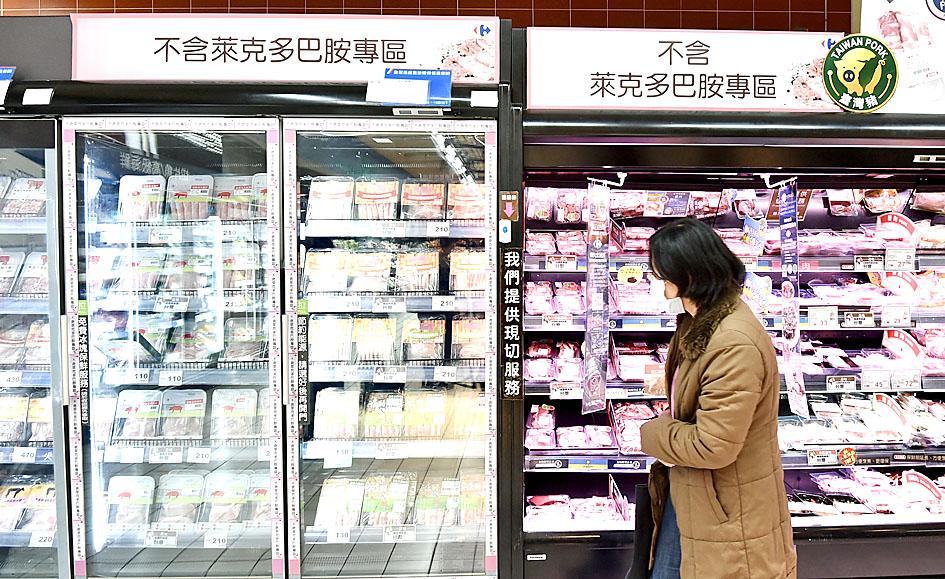President Tsai Ing-wen (蔡英文) yesterday in her New Year’s Day speech asked Taiwanese for understanding over the government’s decision to open up to imports of US pork containing traces of ractopamine.
Although the animal feed additive is banned for use in pigs in Taiwan, because of concerns over its safety to animals and humans, lawmakers on Thursday last week approved administrative directives related to the government’s decision to lift restrictions on the import of US pork containing traces of ractopamine and US beef from cattle older than 30 months.
The changes, effective yesterday, are widely viewed as an effort by the government to satisfy US prerequisites for negotiations on a bilateral trade agreement.

Photo: Tu Chien-jung, Taipei Times
Tsai said that Taiwan “depends on trade to survive” and had resolved to move forward on a policy that had been “left pending by three successive administrations.”
“With utmost humility, I ask my fellow citizens for your understanding and hope everyone knows that we thought long and hard before we made this decision,” she said.
Tsai defended the policy not only in terms of trade, but also geopolitics.
In response, Taipei Mayor Ko Wen-je (柯文哲) said that the government did not consult the public or opposition parties before announcing the lifting of the ban, and gave local governments just seven days to prepare for the new regulations.
The Executive Yuan’s announcement on Thursday that it was nullifying local government ordinances banning meat products containing traces of ractopamine was “calculated, conspiratorial and without humility,” Ko said.
“The people are watching. It does not matter what you say, it is what you do,” he said.
Ko was speaking during a visit to a “ractopamine-free pork” section of a Carrefour hypermarket, which was established after the Taipei City Government passed ordinances requiring importers to test pork for the substance and stores to label pork products.
Carrefour, RT-Mart, Costco and Breeze are among 11 retailer chains operating in the city that have set up “ractopamine-free pork” sections in their stores, the Taipei Department of Health said.
Officials are to increase a random inspections program at food courts, street food vendors and markets, the department said, adding that false labeling would result in a fine of up to NT$4 million (US$140,311) under the Act Governing Food Safety and Sanitation (食品安全衛生管理法).
New Taipei City Mayor Hou You-yi (侯友宜) yesterday visited a “ractopamine-free cuisine” section of the Global Mall at Banciao Railway Station.
New Taipei City last month announced ordinances mandating ractopamine labels for nine types of vendors and the regulations would be implemented in stages, Hou said.
In the first stage, the rules apply to Western fast-food franchises, restaurants and caterers serving 20 tables or more, supermarkets serving prepared food or beverages prepared on site and bakery franchises, he said.
In the second half of the year, the city expects to broaden the regulations to include food courts at hospitals, breakfast chains, convenience stores and hypermarkets serving prepared food or beverages prepared on site, and department store food courts, he said.
“It is a done deal that pork imports containing ractopamine is allowed, but I beseech the president to tell the Executive Yuan to mandate that pork products with ractopamine should be labeled, so that the public’s right to know is protected,” Hou said.

Taiwanese can file complaints with the Tourism Administration to report travel agencies if their activities caused termination of a person’s citizenship, Mainland Affairs Council Minister Chiu Chui-cheng (邱垂正) said yesterday, after a podcaster highlighted a case in which a person’s citizenship was canceled for receiving a single-use Chinese passport to enter Russia. The council is aware of incidents in which people who signed up through Chinese travel agencies for tours of Russia were told they could obtain Russian visas and fast-track border clearance, Chiu told reporters on the sidelines of an event in Taipei. However, the travel agencies actually applied

Japanese footwear brand Onitsuka Tiger today issued a public apology and said it has suspended an employee amid allegations that the staff member discriminated against a Vietnamese customer at its Taipei 101 store. Posting on the social media platform Threads yesterday, a user said that an employee at the store said that “those shoes are very expensive” when her friend, who is a migrant worker from Vietnam, asked for assistance. The employee then ignored her until she asked again, to which she replied: "We don't have a size 37." The post had amassed nearly 26,000 likes and 916 comments as of this

US President Donald Trump said "it’s up to" Chinese President Xi Jinping (習近平) what China does on Taiwan, but that he would be "very unhappy" with a change in the "status quo," the New York Times said in an interview published yesterday. Xi "considers it to be a part of China, and that’s up to him what he’s going to be doing," Trump told the newspaper on Wednesday. "But I’ve expressed to him that I would be very unhappy if he did that, and I don’t think he’ll do that," he added. "I hope he doesn’t do that." Trump made the comments in

Tourism in Kenting fell to a historic low for the second consecutive year last year, impacting hotels and other local businesses that rely on a steady stream of domestic tourists, the latest data showed. A total of 2.139 million tourists visited Kenting last year, down slightly from 2.14 million in 2024, the data showed. The number of tourists who visited the national park on the Hengchun Peninsula peaked in 2015 at 8.37 million people. That number has been below 2.2 million for two years, although there was a spike in October last year due to multiple long weekends. The occupancy rate for hotels